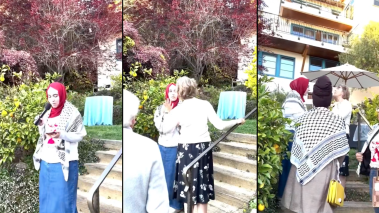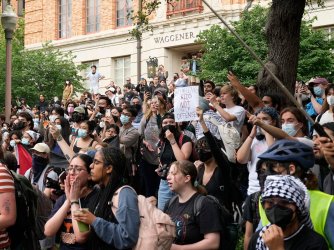Table of Contents
No, the Berkeley Law student didn’t have a First Amendment right to interrupt the dean’s backyard party

Berkeley Law Students for Justice in Palestine
WATCH: Protestors disrupt dinner at the home of UC Berkeley Dean Erwin Chemerinsky.
Earlier this week, the dean of the University of California Berkeley School of Law, Erwin Chemerinsky, hosted an invite-only dinner at his house with third-year law students to recognize their achievements before graduation. But as dinner began in his backyard, one of those students stood up with a microphone and began protesting the war in Gaza, saying, “We refuse to break our fast on the blood of Palestinian people.”
Video from the event shows Malak Afaneh, leader of Berkeley Law Students for Justice in Palestine, being asked several times by Chemerinsky and his wife, law professor Catherine Fisk, to “please leave.” Afaneh refuses, at which point Fisk puts her arm around Afaneh and tries to take her microphone while Afaneh resists, saying: “This is my First Amendment right.”
In the aftermath, FIRE’s social media feeds were filled with people asking and debating important First Amendment questions: Did the First Amendment apply or not? What if it was a school-sponsored dinner? Is there ever a time the First Amendment could apply to speech on private property?
Our analysis is that the student’s actions here aren’t First Amendment-protected. We respond here to your more nuanced questions as we explain why.
Does the First Amendment apply on private property?
No — with some very limited exceptions.
Dean Chemerinsky got it basically right when he responded to Afaneh’s invocation of the Constitution with: “This is my house! The First Amendment doesn’t apply!”
The First Amendment limits how the government can regulate expression. If there’s no government action, the First Amendment’s not in play.
That’s the general rule. We outline the gray areas next.
What if it’s a public university-sponsored event off campus?
The First Amendment applies to school-sponsored or hosted events — but that does not mean any and all speech is allowed. Berkeley is a public university and Chemerinsky, when acting in his role as dean of the law school, is a state actor. And Berkeley reportedly paid for the dinner and the dinner was listed on Eventbrite by the Office of the Associate Vice Chancellor and Dean of Students. These factors together suggest a school-sponsored event.

In such a situation, where the speech at issue occurs on property the government owns or controls, courts ask whether the government has opened a public forum for speech and, if so, what kind of forum. This is “forum analysis.”
What is ‘forum analysis’?
In First Amendment jurisprudence, courts rely on “forum analysis” to determine when and to what extent the state actors may restrict private speech in government-controlled spaces. This typically applies to public property, but we also use forum analysis in any government-controlled space, including virtual spaces like a public college’s listserv or a legislator’s public social media page.
Courts generally recognize four types of forums: traditional, designated, and limited public forums, as well as nonpublic forums.
Public property that has been historically open to public speech — such as public sidewalks or parks — are traditional public forums. Public property that has not traditionally served as a forum for speech — such as a city hall or municipal library — but which the state has purposefully designated in whole or in part as open for expression are designated public forums in the areas in which speech is allowed. In these spaces, the government has very little authority to restrict personal speech.
In other words, public university students don’t have a First Amendment right to take over a backyard dinner party — even one their school is hosting.
Lawful regulations on speech in these spaces include “time, place, and manner” rules — such as closing parks at night for safety, imposing permitting restrictions on large gatherings, and limiting the use of amplified sound. Still, these regulations may not discriminate based on content or viewpoint, must be “narrowly tailored to serve a significant government interest,” and leave open ample alternative channels of communication. Content-based regulations must meet an even higher bar — they must be the least restrictive means available to achieve a compelling government interest. In simpler terms, speech limits must be as minimal as possible in pursuit of an important reason that restrictions actually satisfy.
Other types of public property, such as prisons or military bases, are not traditionally open or designated for public use and thus are nonpublic forums. In a nonpublic forum, the government may restrict public access based on subject matter and speaker identity.
Finally, the limited public forum is a nonpublic forum that has been opened up to a limited amount of public speech, often on a specific topic or for a select category of speakers. An example of a limited public forum might be a public school’s bulletin board, where students can post about upcoming events and other items of interest, but non-students cannot.
If the dinner party was a school-sponsored event, the type of forum would determine the level of speech restrictions allowable — and ultimately whether Afaneh had a First Amendment right to deliver an amplified speech.
Does it being a public school event on private property blur the line?
Normally we don’t apply forum analysis to private speech at a dinner party in a private home because the government does not control the property, and the First Amendment does not affect a private homeowner’s authority to restrict speech in his own home.

But let’s imagine the dinner party for law students at Chemerinsky’s home was, hypothetically, a school event, his backyard was a state-controlled space for the purposes of the dinner party, and Chemerinsky and Fisk were acting as government officials in their roles as hosts. In that case, forum analysis would apply. But the party would be, at most, a limited public forum — a space traditionally not open to the public but that was opened to a limited audience for a specific purpose.
And Chemerinsky and Fisk, as the government officials hosting the school event, could rightfully restrict access — i.e., limit invitations to the dinner — and restrict speech to casual dinner conversation, not political speeches on a PA system, so long as they did not discriminate on the basis of a person’s viewpoint. (Given Fisk’s expressed agreement with the student’s position, and the extent to which the amplified speech disrupted the dinner, there’s little reason to believe Chemerinsky and Fisk would have allowed a student expressing contrary views to speak.)
In other words, public university students don’t have a First Amendment right to take over a backyard dinner party — even one their school is hosting.
Recent Articles
FIRE’s award-winning Newsdesk covers the free speech news you need to stay informed.

Freedom or safety? College admins don’t need to choose.

Texas tramples First Amendment rights with police crackdown of pro-Palestinian protests

Kansas takes a stand for intellectual freedom


